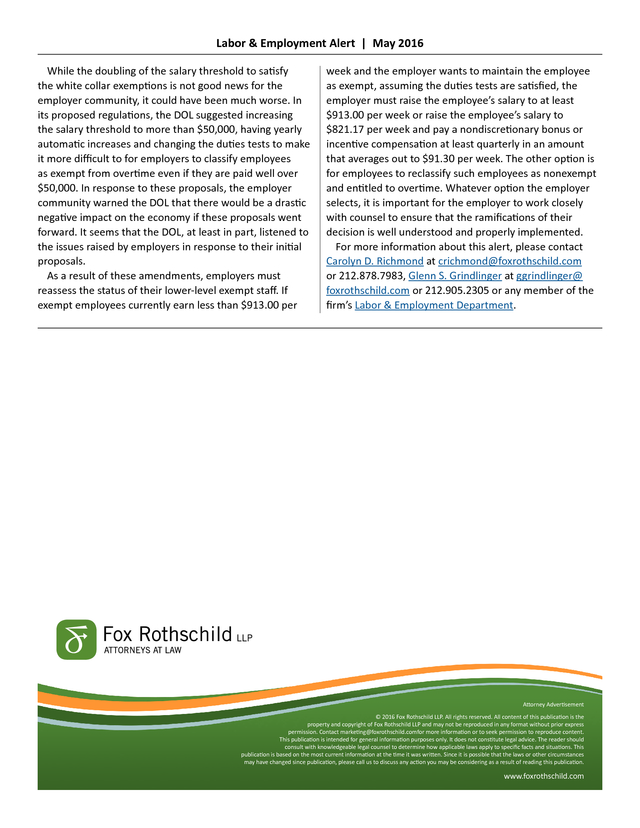It Could Have Been Worse: U.S. Department of Labor Increases the Salary Level Necessary for Employers To Classify Employees as Exempt From Overtime – May 18, 2016
Fox Rothschild
Description
Labor & Employment
May 2016
It Could Have Been Worse:
U.S. Department of Labor Increases the Salary
Level Necessary for Employers To Classify
Employees as Exempt From Overtime
By Carolyn D. Richmond and Glenn S. Grindlinger
On May 18, 2016, the United States Department of
Labor (DOL) released amendments to the overtime
regulations of the Fair Labor Standards Act (FLSA),
which will go into effect on December 1, 2016.
While the amendments significantly increase the
salary that employers will have to pay employees
in order to classify employees as exempt from
overtime under the FLSA’s white collar exemptions,
the amendments are not as severe as the employer
community initially feared.
Further, in a coup for the employer community, the amendments do not impact the duties that must be performed by employees to satisfy the white collar exemptions (i.e., the executive, administrative, professional and computer professional exemptions). Under the FLSA, in order to qualify as exempt from overtime under the white collar exemptions, three factors must be satisfied: • The employee must be paid on a salary basis that is not subject to reduction based on the quality or quantity of the work performed. In other words the employee must receive a guaranteed payment each pay period. • The salary must be at least $455.00 per week, although some state and municipal laws may require that higher salary be paid. • The employee must satisfy the professional, executive, administrative or computer duties tests. The amendments only impact the first two factors and they do not revise any of the duties tests. The amendments essentially make four significant changes to the FLSA’s overtime exemptions. First, they double the weekly salary threshold that must be paid in order to classify an employee as exempt from overtime under the white collar exemptions from $455.00 per week ($23,660.00 per year) to $913.00 per week ($47,476.00 per year). Again, some states and municipalities may have a salary threshold that is even higher than $913.00 per week, in which case the employer must satisfy the higher salary level in order for the employee to be classified as exempt from overtime under the white collar exemptions. Second, for the first time, the amendments allow an employer to use nondiscretionary bonuses and incentive payments (including commissions) to satisfy up to 10 percent of the new standard salary level provided that such nondiscretionary bonuses and incentive payments are paid at least quarterly. In other words, an employer can satisfy the salary threshold by paying the employee $821.17 per week www.foxrothschild.com .
Labor & Employment Alert | May 2016 and paying a quarterly guaranteed bonus of at least $1,186.90. Third, the amendments provide for an automatic increase to the salary threshold. The increase will occur every three years commencing on January 1, 2020, and will be set at the 40th percentile of weekly earnings of full-time salaried workers in the lowestwage Census Region (currently, the South). The DOL will publish the new salary level at least 150 days before it becomes effective. Fourth, the amendments modify the Highly Compensated Employee (HCE) exemption. Under this exemption, employees are exempt from overtime under the FLSA if they receive at least $100,000 in compensation and they regularly and customarily satisfy one or more of the exempt duties referenced in the duties tests for the professional, executive, administrative or exemptions.
The amendments modify the HCE by: • Increasing the compensation threshold from $100,000 per year to $134,004 per year; • Requiring that employees be paid at least $913 per week on a salary basis; and • Automatically increasing the annual compensation threshold every three years starting on January 1, 2020, to the level equal to the 90th percentile of annual earnings of full-time salaried workers nationally. Employers must remember that some states and municipalities do not recognize the HCE exemption in which case employers cannot utilize this exemption. The below chart summaries these key amendments to the FLSA regulations: Current Rule Amended Rule Effective December 1, 2016 Salary Level $455 weekly $913 weekly HCE Total Annual Compensation Level $100,000 annually $134,004 annually Automatic Adjusting None Every 3 years starting on January 1, 2020, maintaining the standard salary level at the 40th percentile of full-time salaried workers in the lowest-wage Census Region and the HCE total annual compensation level at the 90th percentile of full-time salaried workers nationally. Bonuses/Incentive Compensation No provision to count nondiscretionary bonuses and commissions toward the standard salary level. Up to 10 percent of standard salary level can come from nondiscretionary bonuses, incentive payments and commissions, paid at least quarterly. . Labor & Employment Alert | May 2016 While the doubling of the salary threshold to satisfy the white collar exemptions is not good news for the employer community, it could have been much worse. In its proposed regulations, the DOL suggested increasing the salary threshold to more than $50,000, having yearly automatic increases and changing the duties tests to make it more difficult to for employers to classify employees as exempt from overtime even if they are paid well over $50,000. In response to these proposals, the employer community warned the DOL that there would be a drastic negative impact on the economy if these proposals went forward. It seems that the DOL, at least in part, listened to the issues raised by employers in response to their initial proposals. As a result of these amendments, employers must reassess the status of their lower-level exempt staff.
If exempt employees currently earn less than $913.00 per week and the employer wants to maintain the employee as exempt, assuming the duties tests are satisfied, the employer must raise the employee’s salary to at least $913.00 per week or raise the employee’s salary to $821.17 per week and pay a nondiscretionary bonus or incentive compensation at least quarterly in an amount that averages out to $91.30 per week. The other option is for employees to reclassify such employees as nonexempt and entitled to overtime. Whatever option the employer selects, it is important for the employer to work closely with counsel to ensure that the ramifications of their decision is well understood and properly implemented. For more information about this alert, please contact Carolyn D.
Richmond at crichmond@foxrothschild.com or 212.878.7983, Glenn S. Grindlinger at ggrindlinger@ foxrothschild.com or 212.905.2305 or any member of the firm’s Labor & Employment Department. Attorney Advertisement © 2016 Fox Rothschild LLP. All rights reserved.
All content of this publication is the property and copyright of Fox Rothschild LLP and may not be reproduced in any format without prior express permission. Contact marketing@foxrothschild.comfor more information or to seek permission to reproduce content. This publication is intended for general information purposes only. It does not constitute legal advice.
The reader should consult with knowledgeable legal counsel to determine how applicable laws apply to specific facts and situations. This publication is based on the most current information at the time it was written. Since it is possible that the laws or other circumstances may have changed since publication, please call us to discuss any action you may be considering as a result of reading this publication. www.foxrothschild.com .
Further, in a coup for the employer community, the amendments do not impact the duties that must be performed by employees to satisfy the white collar exemptions (i.e., the executive, administrative, professional and computer professional exemptions). Under the FLSA, in order to qualify as exempt from overtime under the white collar exemptions, three factors must be satisfied: • The employee must be paid on a salary basis that is not subject to reduction based on the quality or quantity of the work performed. In other words the employee must receive a guaranteed payment each pay period. • The salary must be at least $455.00 per week, although some state and municipal laws may require that higher salary be paid. • The employee must satisfy the professional, executive, administrative or computer duties tests. The amendments only impact the first two factors and they do not revise any of the duties tests. The amendments essentially make four significant changes to the FLSA’s overtime exemptions. First, they double the weekly salary threshold that must be paid in order to classify an employee as exempt from overtime under the white collar exemptions from $455.00 per week ($23,660.00 per year) to $913.00 per week ($47,476.00 per year). Again, some states and municipalities may have a salary threshold that is even higher than $913.00 per week, in which case the employer must satisfy the higher salary level in order for the employee to be classified as exempt from overtime under the white collar exemptions. Second, for the first time, the amendments allow an employer to use nondiscretionary bonuses and incentive payments (including commissions) to satisfy up to 10 percent of the new standard salary level provided that such nondiscretionary bonuses and incentive payments are paid at least quarterly. In other words, an employer can satisfy the salary threshold by paying the employee $821.17 per week www.foxrothschild.com .
Labor & Employment Alert | May 2016 and paying a quarterly guaranteed bonus of at least $1,186.90. Third, the amendments provide for an automatic increase to the salary threshold. The increase will occur every three years commencing on January 1, 2020, and will be set at the 40th percentile of weekly earnings of full-time salaried workers in the lowestwage Census Region (currently, the South). The DOL will publish the new salary level at least 150 days before it becomes effective. Fourth, the amendments modify the Highly Compensated Employee (HCE) exemption. Under this exemption, employees are exempt from overtime under the FLSA if they receive at least $100,000 in compensation and they regularly and customarily satisfy one or more of the exempt duties referenced in the duties tests for the professional, executive, administrative or exemptions.
The amendments modify the HCE by: • Increasing the compensation threshold from $100,000 per year to $134,004 per year; • Requiring that employees be paid at least $913 per week on a salary basis; and • Automatically increasing the annual compensation threshold every three years starting on January 1, 2020, to the level equal to the 90th percentile of annual earnings of full-time salaried workers nationally. Employers must remember that some states and municipalities do not recognize the HCE exemption in which case employers cannot utilize this exemption. The below chart summaries these key amendments to the FLSA regulations: Current Rule Amended Rule Effective December 1, 2016 Salary Level $455 weekly $913 weekly HCE Total Annual Compensation Level $100,000 annually $134,004 annually Automatic Adjusting None Every 3 years starting on January 1, 2020, maintaining the standard salary level at the 40th percentile of full-time salaried workers in the lowest-wage Census Region and the HCE total annual compensation level at the 90th percentile of full-time salaried workers nationally. Bonuses/Incentive Compensation No provision to count nondiscretionary bonuses and commissions toward the standard salary level. Up to 10 percent of standard salary level can come from nondiscretionary bonuses, incentive payments and commissions, paid at least quarterly. . Labor & Employment Alert | May 2016 While the doubling of the salary threshold to satisfy the white collar exemptions is not good news for the employer community, it could have been much worse. In its proposed regulations, the DOL suggested increasing the salary threshold to more than $50,000, having yearly automatic increases and changing the duties tests to make it more difficult to for employers to classify employees as exempt from overtime even if they are paid well over $50,000. In response to these proposals, the employer community warned the DOL that there would be a drastic negative impact on the economy if these proposals went forward. It seems that the DOL, at least in part, listened to the issues raised by employers in response to their initial proposals. As a result of these amendments, employers must reassess the status of their lower-level exempt staff.
If exempt employees currently earn less than $913.00 per week and the employer wants to maintain the employee as exempt, assuming the duties tests are satisfied, the employer must raise the employee’s salary to at least $913.00 per week or raise the employee’s salary to $821.17 per week and pay a nondiscretionary bonus or incentive compensation at least quarterly in an amount that averages out to $91.30 per week. The other option is for employees to reclassify such employees as nonexempt and entitled to overtime. Whatever option the employer selects, it is important for the employer to work closely with counsel to ensure that the ramifications of their decision is well understood and properly implemented. For more information about this alert, please contact Carolyn D.
Richmond at crichmond@foxrothschild.com or 212.878.7983, Glenn S. Grindlinger at ggrindlinger@ foxrothschild.com or 212.905.2305 or any member of the firm’s Labor & Employment Department. Attorney Advertisement © 2016 Fox Rothschild LLP. All rights reserved.
All content of this publication is the property and copyright of Fox Rothschild LLP and may not be reproduced in any format without prior express permission. Contact marketing@foxrothschild.comfor more information or to seek permission to reproduce content. This publication is intended for general information purposes only. It does not constitute legal advice.
The reader should consult with knowledgeable legal counsel to determine how applicable laws apply to specific facts and situations. This publication is based on the most current information at the time it was written. Since it is possible that the laws or other circumstances may have changed since publication, please call us to discuss any action you may be considering as a result of reading this publication. www.foxrothschild.com .















